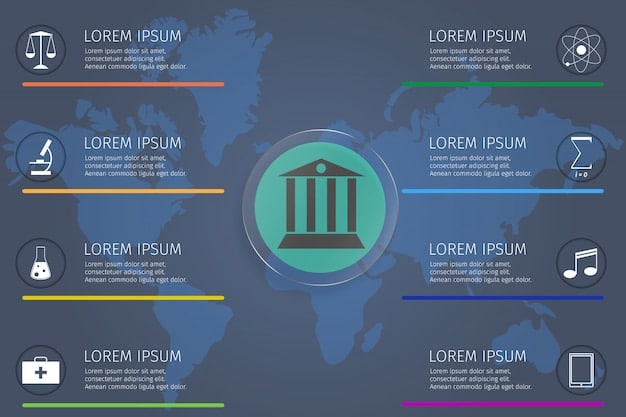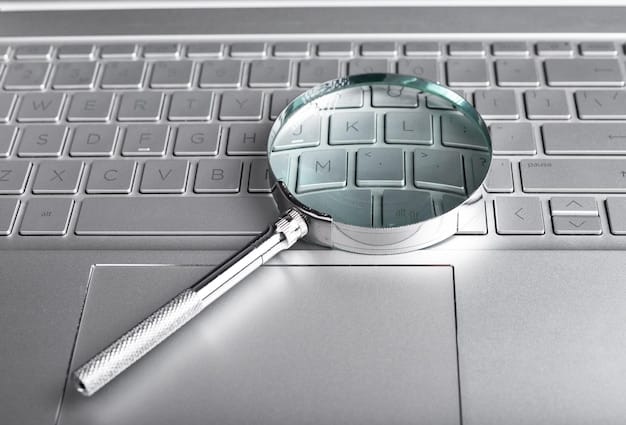Unclaimed Benefits 2025: Find Lost Government Funds

Hundreds of billions of dollars in unclaimed benefits and lost government funds accumulate annually, a substantial portion of which belongs to individuals unaware of their entitlements; this guide outlines practical steps to identify and claim these dormant assets by 2025.
In 2025, a surprising amount of money, often from government sources, remains unclaimed, waiting for its rightful owners. These unclaimed benefits: how to find and recover lost government funds in 2025 is a critical question for many who might be unknowingly eligible for financial windfalls. From forgotten tax refunds to dormant insurance policies, the sheer volume of these unclaimed assets is staggering, representing a significant opportunity for individuals and families to reclaim what is rightfully theirs.
Understanding unclaimed benefits and why they exist
Unclaimed benefits encompass a wide array of financial assets that are owed to individuals, businesses, or organizations but have gone uncollected or undelivered for various reasons. These funds originate from diverse sources, including state and federal government agencies, banks, insurance companies, and even utility providers. The primary reason these funds become “unclaimed” is often a simple disconnect: a change of address, a forgotten account, or an heir unaware of a relative’s assets.
Each state and federal agency has specific laws and regulations regarding how long an asset must remain dormant before it is considered unclaimed. Generally, dormancy periods can range from one to five years. After this period, the funds are typically remitted to the state’s unclaimed property division. This process, known as escheatment, aims to protect the assets until the rightful owner or their heirs can claim them.
Common sources of unclaimed government funds
Understanding the common origins of these funds is the first step toward recovering them. Many people mistakenly believe unclaimed money is always from a relative’s estate or a rare tax error, but the reality is much broader.
- Forgotten bank accounts: Savings, checking, or trust accounts that have seen no activity for a set period.
- Uncashed checks: Payroll checks, insurance payments, or utility refunds that were never deposited.
- Dormant insurance policies: Life insurance benefits or annuities where beneficiaries are unaware or difficult to locate.
- Tax refunds: Overpayments or credits from federal or state taxes that were never claimed.
Beyond these common avenues, government agencies also accumulate unclaimed funds from specific programs. For instance, the Department of Housing and Urban Development (HUD) might hold mortgage insurance refunds, or the Department of Veterans Affairs (VA) could have unclaimed benefits for veterans and their families. It’s not just about money; sometimes, these “benefits” can include tangible property, although financial assets are far more prevalent.
The existence of these funds highlights a systemic challenge in modern financial and governmental systems: ensuring that assets reach their intended recipients. As population mobility increases and administrative processes become more complex, the accumulation of unclaimed property becomes an inevitable consequence. Recognizing this context is crucial for anyone embarking on the journey to find and recover lost government funds.
Navigating the search process: federal and state resources
The quest for unclaimed government funds requires a systematic approach, starting with the most prominent federal and state resources. While the idea of “lost money” might seem daunting, various official databases and agencies are specifically designed to help individuals reunite with their assets.
Federal government resources for unclaimed benefits
The federal government holds a significant amount of unclaimed money, spanning various departments and agencies. Each has its own search mechanism, sometimes requiring specific information to initiate a search. It’s important to cast a wide net across these diverse sources.
- IRS Unclaimed Refunds: The Internal Revenue Service often has unclaimed tax refunds due to uncashed checks or incorrect addresses. The IRS website provides a tool to check the status of a refund, which is the primary way to determine if you have an unclaimed federal tax refund.
- Treasury Unclaimed Savings Bonds: The U.S. Department of the Treasury holds matured, unredeemed savings bonds. Their TreasuryDirect website allows individuals to search for these bonds, often requiring details like a Social Security number or bond serial number.
- Veterans Affairs (VA) Benefits: The VA may hold unclaimed life insurance payouts, pension payments, or other benefits for veterans or their beneficiaries. Searching their records might involve contacting the VA directly or using their online inquiry forms.
- HUD/FHA Mortgage Insurance Refunds: If you had a Federal Housing Administration (FHA) insured mortgage, you might be entitled to a refund of your mortgage insurance premium. HUD provides an online search tool to check for these refunds.
It’s important to remember that these federal resources are distinct from each other. A search on the IRS site won’t reveal an unclaimed savings bond, and vice-versa. Patience and thoroughness are key when navigating these disparate federal systems. Many people overlook specific federal programs they might have participated in, underestimating the range of potential unclaimed benefits.
State-level unclaimed property databases
The vast majority of unclaimed property is held at the state level. Each state has an unclaimed property program, typically managed by its comptroller’s office or department of revenue. These programs serve as custodians for abandoned funds and assets remitted by businesses and organizations.
The National Association of Unclaimed Property Administrators (NAUPA) offers a centralized search portal, MissingMoney.com, which allows users to search multiple state databases simultaneously. While MissingMoney.com is a powerful tool, it does not include all states due to varying participation, making direct state searches still necessary for a comprehensive approach.
For states not covered by MissingMoney.com, or for those who prefer to go directly to the source, a simple web search for “[Your State] unclaimed property” will usually lead to the official state website. On these sites, you typically need to provide your name, and sometimes previous addresses, to initiate a search. Given that people often move, checking former states of residence is highly advisable, as unclaimed funds might be held in a state where you once resided or did business.

These state portals are often more encompassing than federal ones, covering everything from forgotten utility deposits to uncashed payroll checks and safe deposit box contents. The process of searching is generally straightforward, but claiming can sometimes require extensive documentation and verification, especially for heirs or complex cases. The beauty of these systems is their public accessibility, allowing anyone to search for free and without middlemen.
Advanced search strategies for more complex cases
While basic searches cover most common scenarios, some unclaimed benefits require a more granular approach. These advanced strategies are particularly useful for individuals with common names, those searching on behalf of deceased relatives, or those dealing with older, less digitalized records.
Searching for unclaimed funds for deceased relatives
One of the most frequent scenarios for discovering substantial unclaimed benefits involves deceased family members. Often, heirs are unaware of all financial assets their loved ones possessed, leading to money being left behind. The process here is similar to personal searches but includes additional legal considerations and documentation.
- Estate records and wills: Reviewing existing estate documents, wills, and trusts can provide clues on financial institutions or companies associated with the deceased, narrowing down search targets.
- Death certificates and probate documents: Most unclaimed property divisions will require a death certificate and proof of your legal right to claim the funds (e.g., letters of administration, power of attorney, or a will designating you as an heir).
- Previous addresses and names: Search using all known previous addresses and any maiden names or aliases of the deceased. Financial institutions often report unclaimed property under the last known address or name on file.
It is important to remember that state laws vary regarding the documentation required to claim a deceased person’s property. Always check the specific requirements of the state holding the funds before submitting a claim. This proactive approach can prevent delays and frustration in the recovery process. Legal counsel specializing in probate or estate law can also be invaluable for extremely complex cases or large sums.
What about common names and nicknames?
Having a common name, like John Smith, can make the search for unclaimed funds more challenging as you might encounter many false positives. Similarly, individuals might have used nicknames or slight variations of their names on accounts, making direct searches difficult.
To overcome this:
When you have a common name, broaden your search by including any middle names, initials, or specific suffixes (Jr., Sr., III) that might have been used. If you have ever legally changed your name, search under all previous names. For nicknames, consider if the nickname was ever formally used in any financial or official capacity. If so, a search under that specific variant might be fruitful. The key is to think comprehensively about every identity you have ever used or been associated with financially.
Additionally, leverage specific identifying information beyond just names. Social Security numbers (if permitted by the search tool and for federal searches), old addresses (including apartment numbers), and even old phone numbers can act as unique identifiers that help pinpoint your claim among hundreds of similar names. The more precise information you can provide, the higher the chance of successful identification.
The claiming process: documentation and verification
Once you locate potential unclaimed funds, the next step is initiating the claim process. This stage often involves providing substantial documentation to prove your identity and your rightful ownership of the assets. The requirements vary by state and the type of unclaimed property, but a general understanding of what to expect can streamline the process.
Essential documents for claiming funds
The cornerstone of any claim is robust documentation. Gather these documents before initiating your claim to avoid delays:
- Proof of Identity: A government-issued photo ID, such as a driver’s license or passport, is always required.
- Proof of Address: Documents like utility bills, bank statements, or vehicle registrations that show your current address and any previous addresses pertinent to the claim.
- Proof of Social Security Number (SSN) or Taxpayer Identification Number (TIN): Your Social Security card or a document displaying your full SSN is often necessary for verification.
- Proof of Relationship (for heirs): If claiming on behalf of a deceased person, you’ll need a death certificate and legal documents proving your relationship and right to the assets (e.g., will, letters of administration, probate court orders).
- Supporting Documentation for the Claim: Any original or certified copies of documents related to the unclaimed property, such as old bank statements, uncashed checks, insurance policy documents, or correspondence from the original holder. Sometimes, even old mail addressed to the property’s address can be helpful.
Each state’s unclaimed property division will have a specific list of required documents on their website. It’s crucial to review this list carefully and provide all necessary information in the required format. Missing or incorrect documentation is the most common reason for claim delays or rejection. Remember that many agencies prefer certified copies of legal documents rather than originals for security reasons.
Understanding the verification timeline
The time it takes to verify and process an unclaimed property claim can vary significantly, ranging from a few weeks to several months, or even longer for complex cases. Several factors influence this timeline:
The volume of claims the agency is processing, the completeness and accuracy of your submitted documentation, and the complexity of your claim (e.g., claiming a small utility refund versus multiple large accounts from a deceased relative). Some states offer online tracking systems to monitor your claim’s progress, which can provide a valuable update without needing to directly contact the agency.
Typically, after submitting your claim, the agency will review your documents. They may contact you for additional information or clarification. Once verified, the agency will process the payment, usually by check mailed to your verified address. Patience during this period is essential, as the process is designed to prevent fraudulent claims and ensure the funds reach the rightful owner. If you experience undue delays, follow up with the agency using their published contact methods.
Protecting yourself from scams and pitfalls
As the potential for retrieving unclaimed funds grows, so does the risk of encountering fraudulent schemes. Scammers often target individuals seeking lost money, promising quick returns for a fee or attempting to trick them into revealing sensitive personal information. Knowing how to identify and avoid these pitfalls is crucial for a safe and successful search.
Identifying common scam tactics
Fraudsters use various sophisticated methods to deceive individuals. Be vigilant for the following red flags:
- Upfront fees: Legitimate government agencies and state unclaimed property programs will never charge you a fee to search for or claim your property. If someone asks for an upfront payment to “release” your funds, it’s a scam.
- “Guaranteed” results: No one can guarantee that you have unclaimed money, nor can they guarantee its recovery. Be wary of anyone making such definitive promises.
- Requests for sensitive personal information via unsecured channels: Avoid providing your Social Security number, bank account details, or other highly sensitive information over unsolicited emails, unsecure websites, or phone calls from unknown numbers.
- Pressure tactics: Scammers often try to rush you into making decisions or sharing information, claiming the offer is time-sensitive or that you’ll lose the opportunity.
Reputable “money finders” or asset recovery firms do exist, but they operate on a contingency basis, taking a percentage only if they successfully recover funds for you. Even then, you should only engage with such firms after verifying their legitimacy and checking their reviews and credentials with the Better Business Bureau or state consumer protection agencies. Always remember that you can perform all the searches and make claims yourself for free.
Best practices for secure searching
To ensure your search for unclaimed benefits remains secure, adopt these best practices:
Always use official government websites for your searches. Look for “.gov” domains for federal agencies and verify the full URL for state websites. You can often find official links through the National Association of Unclaimed Property Administrators (NAUPA) website, which serves as a trusted portal for legitimate state programs. Be skeptical of pop-up ads or unsolicited emails claiming you have unclaimed money; these are almost always scams.

Protect your personal information by using strong, unique passwords for online accounts. Never click on suspicious links in emails or text messages, even if they appear to be from a legitimate source. Instead, type the official website address directly into your browser. Regularly monitor your credit reports for any signs of fraudulent activity, as unclaimed property scams often lead to identity theft. By maintaining a high level of caution and skepticism, you can significantly reduce your risk of falling victim to scams while searching for your rightful funds.
Looking ahead: what to expect in 2025 and beyond
The landscape of unclaimed benefits is continually evolving, influenced by technological advancements, changes in legislation, and shifts in financial practices. Staying informed about these trends can help individuals navigate the search and recovery process more effectively in 2025 and the years to come.
Technological advancements in tracking and recovery
As technology progresses, so does the ability of state and federal agencies to track and reunite owners with their unclaimed property. Expect to see more sophisticated online search tools and integrated databases.
- Enhanced data matching: Government agencies are increasingly using advanced algorithms and data analytics to cross-reference records from various sources, making it easier to identify potential matches even with incomplete information.
- Mobile accessibility: Many states are improving their mobile platforms, making it more convenient to search and submit claims from smartphones and tablets.
- Blockchain and digital ledgers: While still in early stages for public unclaimed property, emerging technologies like blockchain could eventually offer more transparent and immutable records, potentially simplifying future recovery processes for some digital assets.
These technological improvements aim to reduce the volume of unclaimed property and accelerate the recovery process. However, they also mean that individuals might be more easily identified as having unclaimed funds without having to initiate a search themselves. This proactive approach by governments underlines a commitment to returning lost assets.
Changes in legislation and policy
Legislation surrounding unclaimed property is subject to change at both federal and state levels. These changes can impact everything from dormancy periods to the type of assets considered unclaimed and the ease of the claiming process.
Keep an eye on proposed bills or policy changes related to escheatment laws. For instance, some states might shorten dormancy periods, meaning assets are transferred to the state quicker. Others might expand the definition of unclaimed property to include new types of digital assets, such as cryptocurrency or digital gift cards. Staying updated through financial news outlets or government websites can provide valuable insights into these regulatory shifts.
Moreover, there’s a growing conversation about federalizing a portion of unclaimed property, or at least creating a more unified national database. While a full federal system is not on the immediate horizon, any moves towards greater interstate cooperation or a more centralized search platform would significantly simplify the process for individuals searching across multiple states. These potential legislative shifts underscore the dynamic nature of unclaimed benefits and the importance of being adaptable in your search strategy.
Strategies for preventing future unclaimed funds
While recovering existing unclaimed benefits is important, taking proactive steps to prevent future funds from becoming lost is equally valuable. Small changes in financial habits and record-keeping can make a significant difference in ensuring your assets always remain within your reach.
Best practices for managing personal finances
Effective financial management is the cornerstone of preventing future unclaimed funds. This isn’t just about saving money, but also about keeping meticulous records and being organized.
- Update contact information regularly: Anytime you move or change your phone number or email address, update it with all financial institutions, utility providers, and any organizations from which you receive payments or benefits.
- Monitor all accounts: Regularly review statements for bank accounts, investment portfolios, and insurance policies. Even a quick glance can reveal inactivity or discrepancies that could lead to funds becoming unclaimed.
- Consolidate accounts: If you have multiple small bank accounts or obscure investment accounts, consider consolidating them. Fewer accounts mean less to track and a reduced chance of one becoming dormant.
- Keep a centralized record: Maintain a secure, centralized list of all your financial accounts, including account numbers, login details, and contact information for the institutions. This record should be easily accessible to a trusted family member or executor in case of an emergency or your passing.
For instance, if you receive a small refund check from a utility company, cash it immediately rather than putting it aside. Small, forgotten checks are a common source of unclaimed property. Similarly, active use of all your bank accounts, even if it’s just a small transaction every few months, can prevent them from being deemed dormant.
Educating family members and beneficiaries
One of the most powerful strategies for preventing long-term unclaimed funds is to ensure your family, especially beneficiaries, are aware of your financial arrangements. This becomes particularly critical when planning for estates and inheritances.
Discuss your financial affairs with a trusted family member or your designated executor. Inform them about the location of your important documents, your financial advisors, and any significant assets or liabilities. Sharing this information, perhaps through a simple “In Case of Emergency” binder or digital file, can save your loved ones considerable stress and effort when managing your affairs after you are gone. This proactive communication helps them navigate what assets you possess and reduces the likelihood of funds being overlooked.
Encourage them to understand the concepts of unclaimed property and how to search for it, not just for your assets but also for their own and other relatives. By making financial transparency a family norm, you create a network that can prevent assets from ever truly becoming “lost.” This educational aspect is particularly important within the education category, as knowledge dissemination is key to empowerment in financial matters.
| Key Point | Brief Description |
|---|---|
| 🔍 Search Widely | Check both federal & state databases, including past residences, for unclaimed funds. |
| 📄 Prepare Documents | Gather IDs, proof of address, SSN, and heir documentation for efficient claims. |
| 🛡️ Avoid Scams | Never pay upfront fees; only use official government “.gov” websites for searches. |
| 💡 Prevent Future Loss | Update contact info, consolidate accounts, and inform family members about finances. |
Frequently asked questions about unclaimed government funds
Unclaimed government funds are financial assets or benefits that are owed to individuals or entities by federal or state government agencies but have gone uncollected. This can include anything from old tax refunds and uncashed government checks to dormant savings bonds and even mortgage insurance refunds from agencies like HUD. Funds become “unclaimed” when owners move without updating their address, forget about an account, or pass away without heirs knowing about all assets.
Begin by searching state unclaimed property databases, often accessible via MissingMoney.com or your state’s treasury/comptroller website. For federal funds, check specific agency sites like IRS.gov for tax refunds, TreasuryDirect for savings bonds, or HUD for mortgage insurance refunds. It’s crucial to search using all previous names and addresses you or the person you’re searching for (e.g., a deceased relative) might have used, as funds can be held in any state where activity occurred.
No, reputable government agencies and state unclaimed property programs never charge a fee to search for or claim your funds. All official search portals are free to use. Be extremely wary of any service or individual who asks for an upfront fee or a percentage of your potential claim just to help you search or submit paperwork. These are almost always scams designed to defraud you.
Typically, you will need government-issued photo identification (like a driver’s license or passport), proof of your current and relevant past addresses (utility bills, bank statements), and your Social Security Number. If claiming on behalf of a deceased relative, you’ll also need their death certificate and legal documentation proving your right to the funds, such as a will, letters of administration, or probate court orders. Each state has specific requirements, so check their official website.
The processing time for unclaimed fund claims varies significantly from state to state and depends on the complexity of your claim and the volume of submissions. It can range from a few weeks to several months. Complex claims, those involving deceased individuals, or inadequate documentation tend to take longer. Many states offer online portals where you can track the status of your claim, providing an estimate of the expected processing time.
Conclusion
The journey to find and recover unclaimed benefits: how to find and recover lost government funds in 2025 is a tangible opportunity for many individuals to reclaim what is rightfully theirs. With billions of dollars lying dormant across various federal and state programs, a proactive and informed approach can lead to significant financial recovery. By leveraging official government databases, understanding the necessary documentation, and remaining vigilant against scams, you can navigate this process with confidence. More importantly, adopting sound financial practices, such as regularly updating contact information and informing beneficiaries, can prevent future assets from becoming lost, ensuring financial security for generations to come. The effort invested in finding these funds is a step towards greater financial literacy and empowerment.





